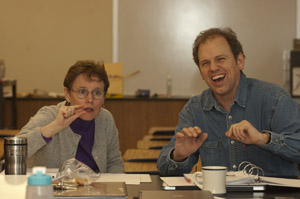Recognition of leadership among teachers is now part of a national initiative. Traditionally, teachers who want to be leaders work toward becoming principals or central office administrators. However, many teachers prefer to stay in the classroom, and at the same time, share their expertise with colleagues and the community.
In today’s schools, this is becoming an option for more teachers. Most often leadership opportunities for teachers involve presenting at workshops or conferences, or leading initiatives in their own and other schools.
Through a $631,000 grant from the National Science Foundation’s Robert Noyce Master Teacher Scholarship Program, Phyllis Balcerzak guides a group of local educators who study teacher leadership.
Balcerzak, director of professional development for Washington University’s Science Outreach, envisions a program that builds on current teacher leadership by facilitating sustained cross-district networks and joint projects.
WUSTL’s Science Outreach program supports math and science education for K-12 students and educators trhough graduate courses, school partnerships and enrichment programs.
“At the foundation of Science Outreach leadership programs are structures that support teachers to reflect on challenges and help each other find solutions,” she explains.
Balcerzak is a teacher educator who has worked in WUSTL’s preservice teacher preparation program, and previously as an ecologist, an environmental chemist and a biology teacher. She directs teacher education programs for Science Outreach, including a graduate degree program for biology teacher leaders.
She also points to research that indicates teachers can make changes in curriculum and instruction through collaboration, both within and outside of their districts.
“When teachers talk deeply about their profession, ideas emerge that can inform policy in positive, productive ways,” says Balcerzak.
The Noyce fellows collaborate with Balcerzak and other WUSTL faculty monthly. They develop leadership projects through professional organizations and other local school districts. Teachers accepted to the program have master’s degrees and several years of experience. They also receive a stipend for the three-year program.

Joan Braun, science teacher at Cross Keys Middle School, has participated in several courses and partnership efforts with WUSTL. She says her interest in the Noyce program came from WUSTL’s unique approach to teacher development.
“Washington University creates opportunities for science teachers that aren’t available anywhere else,” she says. “This program provides a way to go beyond the surface, to look more deeply into science-related topics. It allows us to collaborate and develop supportive projects, and share experiences with each other,” explains Braun.
The seven Noyce fellows include two science teachers from the Ferguson-Florissant School District, Braun and Melanie Canaday, Berkeley Middle. They also include Chris Cronin, biology teacher at Roosevelt High, St. Louis Public; Chuck McWilliams, biology teacher at Maplewood-Richmond Heights High; Liz Peterson, science teacher at Ladue Middle; Tony Thomas, physics teacher at University City High ; and Kelly Williams, science teacher at Holman Middle, Pattonville School District.
Science Outreach will accept additional Noyce fellows in 2010. To learn more about the program, contact Balcerzak at (314) 935-6846 or pbalcerz@wustl.edu.